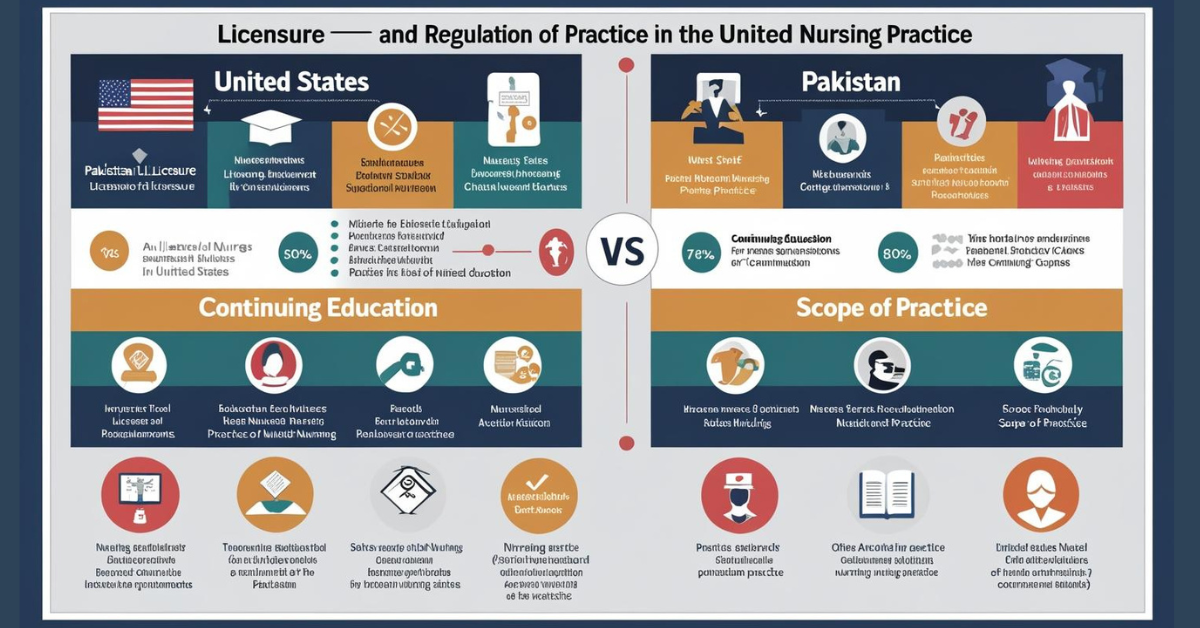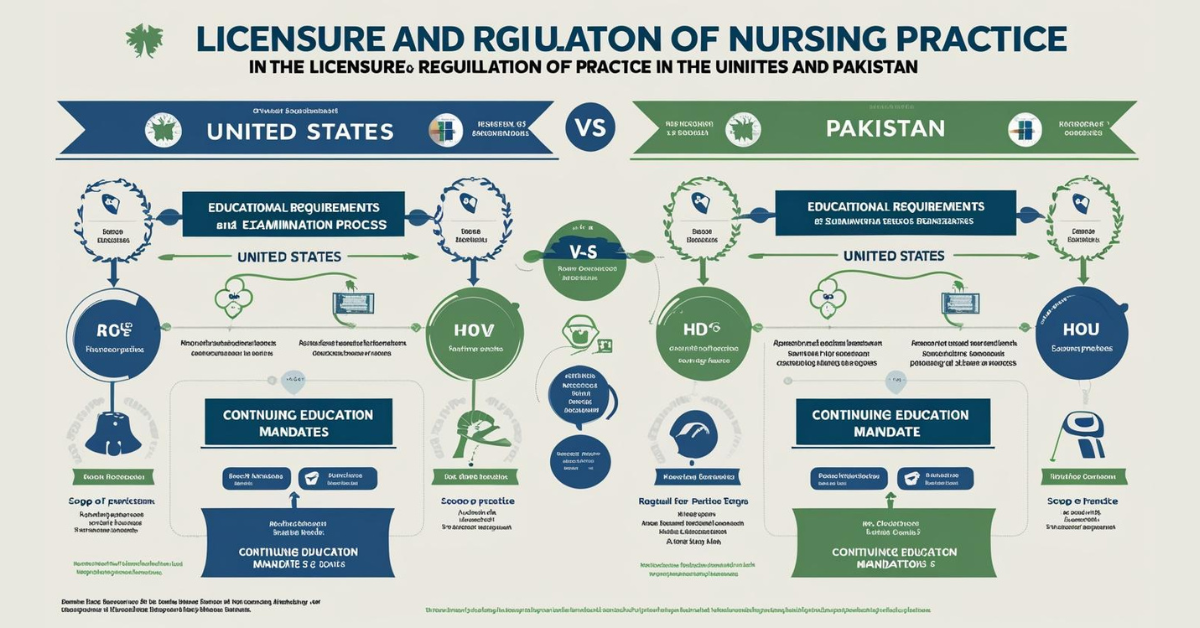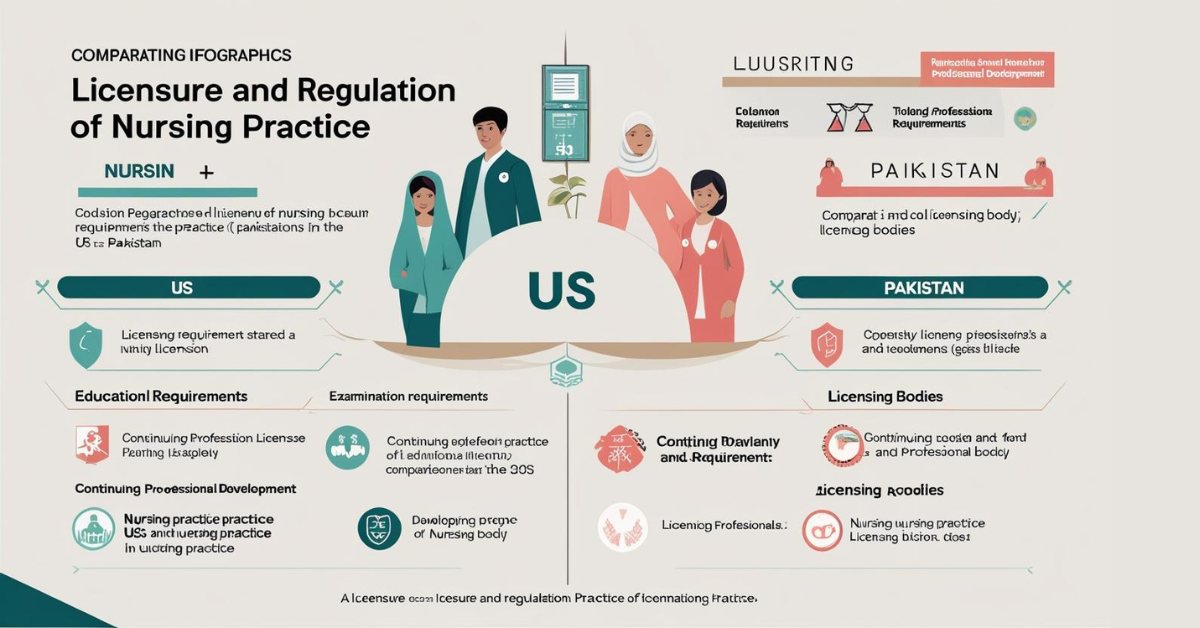What are Licensure and Regulation of Nursing Practice. In essence, the licensing and regulation of nursing practice are critical to maintaining the integrity and quality of the nursing profession and, ultimately, protecting the public welfare.
The Licensure and Regulation of Nursing Practice
Health care in the United States is a highly regulated industry. Nursing care can pose a risk of harm to the public if practiced by professionals who are unprepared or incompetent. Federal and state governments have a responsibility to protect those receiving health care through licensure of individuals and regulation of health-care organizations.
Licensing and regulating nursing practice ensure public safety by establishing standards for the training, examination, and professional practice of nurses. The Pakistan Nursing and Midwifery Council (PNMC) plays a critical role in this process, granting licenses and maintaining professional standards.
Licensure
Licensure is the process by which boards of nursing grant permission to an individual to engage in nursing practice after determining that the applicant has the necessary competencies (National Council of State Boards of Nursing [NCSBN], 2014a). In the United States and Canada, nursing licensure is mandatory. In the United States, the basic requirements for a nursing license are graduating from an approved nursing program and successfully passing the National Council Licensing Examination for Registered Nurses (NCLEX-RN), developed by the NCSBN.
Nursing licensure assures the public that those calling themselves nurses have met regulatory standards specific to the nursing profession. Licensure is a way to hold nurses who violate nurse practice acts and standards of practice accountable for their actions and ensures that foreign-educated nurses have met U.S. standards (NCSBN, 2011a). Nurse leaders and managers must verify and monitor licensure of all nursing staff.
Regulation
The nursing profession ensures that members act in the public’s best interest when providing nursing care through professional regulation, self-regulation, and legal regulation (ANA, 2010). Professional regulation consists of the oversight, monitoring, and controlling of members based on principles, guidelines, and rules deemed standard in the profession. Self-regulation is personal accountability for one’s professional nursing practice based on those same principles, guidelines, and rules; nurses regulate their own practice by maintaining current knowledge, skills, and attitudes through academic and continuing education.
Legal regulation consists of oversight and monitoring based on applicable statutes and regulations such as licensure, nurse practice acts, civil law, and criminal law (ANA, 2010). Federal and state regulations are overseen by administrative agencies; two of the most important are the NCSBN and the state boards of nursing.
Regulatory Bodies In Pakistan
Pakistan Nursing and Midwifery Council (PNMC)
Independent regulatory body responsible for the licensing and registration of nurses and midwives in Pakistan.
Provincial Nursing Examination Boards (NEB)
These boards, established under the Pakistan Nursing Council Act of 1973, conduct examinations, issue diplomas, and review documents for nursing institutions.
Punjab Nursing and Midwifery Council (PNRC)
Another body in Punjab responsible for the registration and maintenance of standards for nurses and healthcare professionals.
Functions of Regulatory Bodies
Registration and Licensing: Licensing for the practice of nursing. Maintenance of Standards: Establishing and maintaining educational and practice standards for nurses.
Examination: Administering examinations for nursing students and practitioners.
Advisory Function: Providing guidance and advice on nursing practice and education.
Complaint Handling: Handling complaints and grievances related to nursing practice.
Key Processes
Registration
Nurses and nursing students register with the PNMC to practice or study nursing.
License Renewal
Licensed individuals must renew their licenses regularly to maintain their professional eligibility.
Examination
Nurses must pass the relevant examinations administered by the respective regulatory bodies to obtain a license.
Importance of Regulation
Public Safety: Ensuring that nurses are competent and qualified to provide safe and effective care.
Professional Standards: Maintaining ethical and professional conduct within the nursing profession.
Nursing Quality: Promoting high-quality care by establishing and maintaining standards.
State Nurse Practice Acts in US
All states and territories of the United States have enacted a nurse practice act (NPA) through state legislature. Each NPA establishes a board of nursing that has the authority to develop rules and regulations to clarify the law. The rules and regulations must be consistent with the NPA and undergo a process of public review before enacted (NCSBN, 2014b). All NPAs include the following (NCSBN, 2014b, para. 5):
- Authority, power, and composite of a state board of nursing
- Education program standards
- Requirements for licensure
- Types of titles and licenses
- Scope and standards of nursing practice
- Grounds for disciplinary action, other violations, and possible remedies
Nurses are accountable for the rules and regulations that govern nursing practice in any state in which they work. Therefore, it is nurses’ responsibility to ensure they have a good understanding of their state’s NPA. Nurse leaders and managers have a responsibility to ensure that nursing staff members comply with the state NPA.
National Council of State Boards of Nursing
Besides developing the NCLEX-RN, the NCSBN is responsible for promoting uniformity of nursing regulation. The NCSBN is a not-for-profit organization whose membership consists of a board of nursing members from the United States, the District of Columbia, and the U.S. territories of American Samoa, Guam, Northern Mariana Islands, Puerto Rico, and the Virgin Islands.
The purpose of the NCSBN is to provide an organization through which state boards of nursing collaborate on nursing regulations to promote public health, safety, and welfare (NCSBN, 2014a). The NCSBN also maintains a national database on disciplinary action taken against nurses, the National Practitioner Data Bank.
State Boards of Nursing
State boards of nursing protect the public by enforcing the NPA to promote safe, competent nursing care. The role of the state board of nursing varies by state but typically includes the following (NCSBN, 2011a):
- Enforcing the state’s NPA and nurse licensure
- Accrediting or approving nursing education programs
- Developing practice standards, policies, and administrative rules and regulations
- Addressing violations of the NPA Unsafe or incompetent nursing practice should be reported to the state board of nursing.
Violations of the NPA or unsafe nursing practice is taken seriously. The state board of nursing reviews each case to determine whether misconduct or unsafe practice has occurred and what actions should be taken. Examples of serious reportable behaviors that violate the NPA include the following (NCSBN, 2011b, p. 3):
- Being impaired by drugs or alcohol while working
- Stealing from a patient
- Practicing out of the scope of practice, such as providing treatment that should be provided only by a physician or advanced practice registered nurse
- Falsifying records
- Physically or sexually abusing a patient
- Participating in criminal conduct Nurse leaders and managers are responsible for understanding the state board of nursing regulations and the state NPA.
Federal and/or State Legislation
Many federal and state laws have been implemented to improve health care and, in turn, affect nursing practice.
Read More:
https://nurseseducator.com/didactic-and-dialectic-teaching-rationale-for-team-based-learning/
https://nurseseducator.com/high-fidelity-simulation-use-in-nursing-education/
First NCLEX Exam Center In Pakistan From Lahore (Mall of Lahore) to the Global Nursing
Categories of Journals: W, X, Y and Z Category Journal In Nursing Education
AI in Healthcare Content Creation: A Double-Edged Sword and Scary
Social Links:
https://www.facebook.com/nurseseducator/
https://www.instagram.com/nurseseducator/
https://www.pinterest.com/NursesEducator/
https://www.linkedin.com/in/nurseseducator/
https://www.researchgate.net/profile/Afza-Lal-Din
https://scholar.google.com/citations?hl=en&user=F0XY9vQAAAAJ


